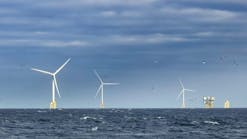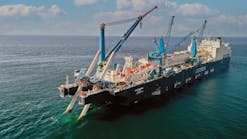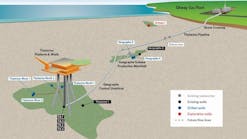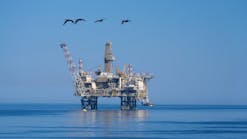Fred Akanni
Lagos
Chevron protecting Africa programs, despite recession
Chevron's plan to achieve operating and other expense reductions in selected operating companies and all corporate departments, totaling about $500 million in 1999 will not affect the upstream expenditure, especially in Africa, according to the corporation's chairman Ken Derr.The American giant churns out 40% of its worldwide production of 857,000 b/d of liquid hydrocarbon production from Angola and Nigeria. Derr said that the company's 1999 budget of $5.1 billion is a testimony that the company has faith, even in these lean times, and is willing to grow (the budget is 10% less than 1998 budget). At least 20% of the money will be spent on projects in Africa. "We want to preserve upstream growth projects," he said.
One such growth project is the development of the Kuito Field, located in 350 meters of water, in deep offshore Angola. Chevron has awarded contracts worth $400 million for the first phase of development of the field, which is expected to start production of 75,000 b/d in early 2000. Another project is the development of four fields offshore and in swamp locations off Nigeria. Elsewhere, apart from the Tengiz Field in the Caspian, where 200,000 b/d of oil is being produced, the company is cutting costs.
In other events related to Africa production, Chevron's Chairman Ken Derr said a 1 million b/d decrease in global demand for oil, partly as a result of the meltdown of several Southeast Asian economies, is a key reason for the crash in crude oil prices. The other problems are a warm winter in Europe and America and the lack of commitment by OPEC countries to curtail production. He spoke to Chevron employees in a company-wide televised message. Derr added that he couldn't tell when the crisis would abate, but he was sure that prices would rebound to $16-$20/bbl range in the near future. He said that the company's 1999 budget was based on $10-$14/bbl range.
Petronas charges into Africa
Malaysia's state owned oil company Petronas is investing in the oil industry in Africa despite the country's economic crisis. Petronas wants to pick up deepwater leases in Nigeria and has been talking to high-ranking officials within the military government. The Malaysian government is also putting in a word for the company. But, Nigeria has not granted any deepwater lease awards since the indigenous operator, Star Atlantic Petroleum, picked up OPL 246 in the ultra-deepwater zone in mid 1998, and even that was an off chance.Petronas officials have visited Lagos, the commercial hub of Nigeria as well as Abuja, the political capital, several times in the last six months, discussing possible equity spit with some of the majors already operating in the country in the event that they get a lease.
Petronas earth scientists speak excitedly about the 15% the company has in the recently awarded Exxon-operated lease Block 24 in deepwater Angola, but the major investment so far made in Africa is the 80% ownership of Engen, South Africa's refining, marketing, and now upstream oil company. "Let me put it like this," says a top Petronas official, "we haven't been told to stop spending."
Ivory Coast: Ranger banks on CI-26
Of all its five leases in Cote d'Ivoire, Ranger seems satisfied with CI 26, where it has 24% interest even as operator. The partners in the block include Tallow (24%), Addax (42%), and state-owned Petroci (10%). The company is keen on farming out part of its 35% interest in CI 40, CI 101, and CI 103. But, in CI 26, there are activities which distract the company from worrying about selling out acreage interest.Ranger's Espoir Field in CI-26.Studies are ongoing for the development of the Espoir Field in CI 26, with a hope of resuming production at 20,000-25,000 b/d of oil in 2000. It would cost some $234 million to redevelop Espoir, which was discovered in 1980, put onstream in 1982, and abandoned in 1988, after having flowed 31million bbl of 29-33° API oil, and 82 Bcf of gas. Ranger wants to cover the field with 3D seismic in 1999 and use the additional data to characterize the reservoirs. Espoir consists of two lobes of oil filled reservoirs. With seven wells and no secondary recovery applied. The field is believed to have only gushed 7% of its in-inplace oil (STOIP).
Seismic acquisition grows in Nigeria
Conoil hopes chance for success has improved in OPL 458 over the past 25 years.Marine 3D seismic coverage in leases outside of deepwater Nigeria shot ahead of swamp and land coverage as 1998 came to an end. As of December 31, Elf and the indigenous company, Consolidated Oil (Conoil), had joined Shell, in jointly covering a total of 1,140 sq km of marine 3D data in December, against a total of 329 sq km of land and swamp coverage. This is the largest, non-deepwater seismic coverage in the country in the last three years.
Elf and Conoil commenced their shoots in December, covering 444 sq km and 384 sq kmrespectively. Conoil's shoot is in their OPL 458, where they have contracted the Norwegian acquisition company, PGS, to do a blanket survey of the 1,560 sq km acreage. Their primary objective is the Amatu Field discovered by Japan Petroleum in 1973 and relinquished after six wells. Conoil feels that the economics of producing 15,000 b/d of oil of this 50 million bbl field in 75 ft of water, is much better today than 25 years ago. Besides, Conoil is optimistic about the prospectivity of OPL 458, an elongate, northwest-southeast block located east of Agip's deepwater lease OPL 211. There is a seaward-heading, northwest-southeast structure building fault with several footwall closures queuing up on the back of the fault.
Shell has been shooting in OMLs 72, 74, and 77 since September aiming to cover 2,014 sq km on these three leases. It is part of the company's strategy to move its Nigerian operations offshore, where there is less risk of attacks from neighboring communities whose increasing protest about environmental degradation and poor social infrastructure are crimping work of oil companies in Nigeria. Currently, most of Shell's operations in Nigeria are on land.
Copyright 1999 Oil & Gas Journal. All Rights Reserved.







